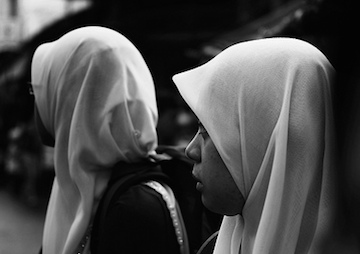How One Teenage Girl Was Almost Lured Into Joining Islamic State
Maysa, a teenager from Brussels, smoked, listened to music and was a “ray of sunshine” at school. And some friendly militants almost led her into the clutches of a belligerent cult. Haifeez / CC BY 2.0
Haifeez / CC BY 2.0
Maysa, a teenager from Brussels, smoked, listened to music and was a “ray of sunshine” at school. And a group of friendly militants almost led her into the clutches of Islamic State.
“I was not thinking my thoughts. I was not myself,” said Maysa, whose real name has been withheld at her request, to journalist Jason Burke at The Guardian.
Maysa had been like many other teenagers – at least those in her neighbourhood on the outskirts of the Belgian capital. Her grandparents had come from Morocco almost 50 years ago, and her parents had been modestly successful in building careers and a home for their children. She speaks two local languages – French and Flemish – fluently, as well as Arabic and some English picked up at school and from music. Her parents are observant Muslims, but far from rigorous. Her marks at school were good and she had lots of friends. […]
A year ago, that sunshine dimmed. First she donned a jilbab, the loose gown and headscarf worn by some devout or traditional Muslim women. There was no more dancing or singing – favourite pastimes before – and no more cigarettes either. There was no more music, whether her preferred American gangsta rap or anything else. Maysa had never drunk alcohol but went out with friends who did. That ended too. […]
Maysa had initially adopted the jilbab to “hide some weight I’d put on”, she says. But when she posted a selfie wearing her new clothes on social media, she was contacted by another woman also in her late teens. They chatted about her “new look” and agreed to go shopping together. Maysa was introduced to a group of young women from a similar background to her own. All except one, a convert, were of immigrant origin and lived in Brussels’s poorer, though far from desperate, neighbourhoods. […]
First the conversation was about Islam, and the failures of many so-called Muslims. Then about politics, and the worldwide persecution of Muslims. Then finally about Isis, and life in the new “caliphate”, and how good life was there. […]
The crisis came early this spring. Maysa was told the group would be leaving within days. She could travel whether or not she had documents as “crossing frontiers was no problem”.
Yet something held her back. Maysa asked her mother where her passport was. Suspecting something, her parents had hidden it. Torn, she asked the group’s leader for time. There was none, she was told. And then came the threats: if she did not travel with them, Maysa would be tracked down, her family and friends too, and the consequences would be terrible.
— Posted by Alexander Reed Kelly.
Your support matters…Independent journalism is under threat and overshadowed by heavily funded mainstream media.
You can help level the playing field. Become a member.
Your tax-deductible contribution keeps us digging beneath the headlines to give you thought-provoking, investigative reporting and analysis that unearths what's really happening- without compromise.
Give today to support our courageous, independent journalists.



You need to be a supporter to comment.
There are currently no responses to this article.
Be the first to respond.